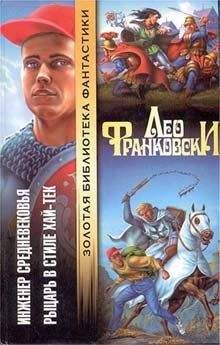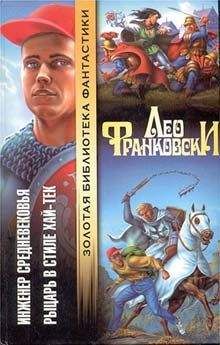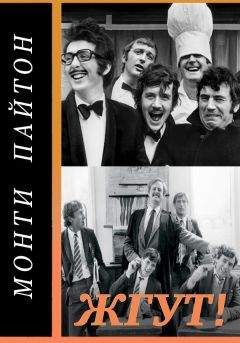Лео Франковски - The Flying Warlord
"The camp was quiet when we left, pulling our small nightfighter carts. See, most of the troops fight out of big, forty-three man platoon carts, but in the dark, there's no way that you can keep track of that many men around you. The most is about six, and you've got to know who your own men are, because everybody else is likely the enemy! So we use a small lance-sized cart, and right then they was unloaded of everything but the gun, ammunition, and grenades that each one carried. We don't use pikes or halberds. In the dark, them weapons ain't worth firewood! But we was pretty good with the knife, the garrote, and the grenade."
"I thought we was clear of the camp when we came on an outlying sentry, and you know it had to be one of Boleslaw's men."
"Hold! Who goes there?"
"Baron Ilya," I says. "Beer run." It was the first thing that came into my head. Never mind that I had nine thousand men coming up behind me.
"Beer? There's two dozen big carts of beer in the camp!"
"Yeah, but that's what our hetman promised you horse jockeys. Now we're going out to get enough for the foot soldiers, too."
"What, all that beer for us alone? Well, carry on then."
"I don't figure that man ever knew he had a creeper right behind him and a garrote over his head. I sure would have hated to do him in, but I did promise Vladimir that nobody would see us leave. If he reported that I went on a beer run, well, wouldn't nobody take it seriously."
"We had scouts ahead planting markers in the ground, sticks split so the white side showed toward us. There wasn't no problem finding the Mongol camp. The only surprise was how big that sucker was! It was fully four miles across and they had fires going all around it. No way we could surround this thing the way I told the duke."
"Fire line, two yards apart, a gross yards from the pickets, pass it on.' I says that would put us a quarter way around the camp, and the carts split off by companies to either side of me, forming wings a mile and a half long. The carts were tipped up on their sides and the guns mounted. They wouldn't be needed for a while, but it's always a good idea to be ready. The signal strings were strung up along both wings, and I waited."
"I got my telescope out and looked over the enemy sentries. Dumbshits, the lot of them! They was sitting around the fires, staring at the fires and talking. A captain with any brains posts his men so the fires show in the enemy's eyes, not your own. Those men were about to get a very expensive education in night-fighting."
"Plan eight, red and white flares. Pass the word,' I whispered to both wings and to the sentry behind me who was sorting out the companies."
"It was a while before we got settled into position, but I wasn't worried none. The thunder and rain covered most everything. We was being quiet mostly out of habit. Them sentries weren't looking for trouble, but that wasn't going to help them none. Trouble had just come looking for them!"
"It would have been nice if I could have gone in with most of the other men, but we'd proved time and again that the leader had best stay back and direct things, so that's the way I had to play it. That's one of Count Conrad's big problems. He always has to do everything hisself, and there ain't nobody can do everything, not and do it fight."
"I got four tugs on the fight-hand string, saying that the fight wing was ready, and a few minutes later, the left-hand string pulled four times."
"I gave both strings three long, slow pulls and watched as the first-string creepers went out. These were the one best lance from each platoon, and we had a lot of contests to see who that lance was. They figured it was an honor to be the ones that went out ahead of the others and killed the sentries real quiet like."
"I saw the men in front of me in position, but I gave it a few more minutes to make sure that everybody else was ready. Then I lit off a small, red rocket. Count Conrad had made these things as a festival toy, but once I saw one, I knew it was just the thing to signal men in the dark."
"If any of the Mongol sentries saw it, they were looking at the rocket and not the men behind them. Just like a machine, six of my men came up behind six of theirs and slipped garrotes over their heads. The wires were pulled tight and most of them heathens didn't hardly even kick around. Those that did got knifed, but most of them got to die without getting their clothes bloodied. The sentry fires were smothered, usually by piling dead Mongols on them and stuffing the edges with mud and dirt, and it was time for phase two."
"I pulled the signal strings again and five more lances from each platoon went out, leaving only the gunners behind. I put a big white rocket in the launcher to be ready in case of any commotion, but I rested back with my telescope for about an hour and let the men do what they were trained for. They were going through the enemy camp, wreaking any silent mayhem they could do, and that was a lot. Those boys went out with six garrotes each, and they all complained later that they could have used more."
"There was a lot of knife work, too. You take sleeping troops a tent at a time, cut every throat at the same instant without a sound, then go on to the next tent. The trick is to get men on their stomachs laying all around the tent, ready to go under it. Then one man walks in the front door, calm as he can, and lights a pocket lighter. Before the sleepers know what's happening, they all have an extra mouth and the light goes out. It takes training and practice, but any job worth doing is worth doing right. I could see quick flashes as tents lit up for a moment and then were dark."
"There were enemy troops up and around, but our men was all walking natural and they weren't much noticed. Those Mongols must have had fifty different kinds of people there, and didn't none of them speak the same language. They all figured that if you was in the camp, you must be on their side, so they each had to learn different on their own. It stayed quiet for the longest time."
"One of the rules was that the most important men in the camp usually had the biggest tents, and these were usually in the center of the camp. When there are more than a dozen in a tent, it gets pretty hard to kill them all without somebody on one side or another making a noise, so doctrine was to frag the big tents. Course, the big ones often had sentries of their own, a sure tip-off that you was in officer country, so the sentries had to be taken out first, but we were pretty good at that sort of thing. When a man's upright, a garrote's the thing to use."
"You could always roll a grenade under a tent, but the effect was better if it was up off the ground. The best way was to slit the tent, put in the grenade dangling from a string with a fish hook on the end and with the wick hanging outside, and then light it with your pocket lighter when the signal went up."
"It was still awfully quiet down there and I checked the traveling clock we had with us. Yeah, it had been over an hour, and it was one of Conrad's double-sized hours at that. Some of the boys would be getting real antsy about now, so it was time for the fireworks."
"I lit off the big white rocket flare, which exploded pretty white streamers over the enemy camp so nobody could miss it."
"In a few seconds, there were explosions all over the Mongol camp, and most especially in the center of it, I was pleased to note."
"I sat back for another two-twelfths of an hour watching the mayhem through my telescope. The boys were really ripping them up. Each man had had two small four-pound grenades in his pack, as well as a big twelve-pounder, and didn't none of that ordinance get carried back to our firing line."
"As the first of our men got back, puffing and running with the big white crosses they'd opened up on their chests so our gunners would know not to shoot them, I started pulling on the signal strings again. The gunners generally let loose with a few rifle grenades first, in part to start some additional fires to shoot by, but mostly because they didn't get to shoot them very often, except for dummies, and they're kind of fun.
"A few fires were started near a horse park and that attracted some gunfire until the surviving horses stampeded through the Mongol camp and out of sight."
"More and more of our men were making it back, but the Mongols themselves hadn't acted like we was here yet. One of my worst nightmares had the enemy and our men running out all mixed together, and the gunners having to shoot them all down or be killed themselves. But that didn't happen. The enemy was real slow on the uptake. Me, I figure that was caused by the way we killed most of their officers, but there ain't no way to prove it. Only it figures, you know?"
"We were almost all back, those that were coming back, anyway, before the invaders got together enough to attack us. There was thousands of them on horseback, all yelling and screaming and running into each other, since they had the muzzle flashes coming in at them and that will blind a man or beast in the dark."
"Then we started doing jerk-fire shooting. That's where each gunner fires just after the man to his left does. This lets him aim by the muzzle flashes of the guns that just went off, so the field is almost perfectly lit up. But the men out there that you're shooting at look like they're jumping and jerking around real funny. Conrad explained it to me once, but I never did figure out what he was talking about."
"From out in front of it, when you're being shot at, it's just plain scary. It looks like there's these big bright moving things streaking from your right to your left, and there isn't a horse that will stay around it. Them that wasn't dead took off and their riders went with them."
"After that, they tried charging us on foot, but we shot that one up just as bad or even a little worse. There was dead bodies as thick as a carpet from their camp to almost our lines. I tell you that a man could have walked on dead Mongols the whole way and never stepped on the ground, they was that thick."
"But we were getting low on ammunition and dawn wasn't that far away. If they knew how few of us there was, they could have walked all over us, and anyhow, I told the hetman that nobody would see us coming back. I signaled a pullout."
"Slow burning flares were stuck into the ground in front of our positions, to maybe make them think we was still there. Then we pulled out in the reverse order that we came, and some of the gunners kept on firing right up to the end. We were halfway back, walking in the rain, when I got the butcher's bill. Four hundred fifty-five missing and likely dead, and damn few wounded. Well, in that kind of a fight, if you were hurt bad, you just didn't get out. We lost a whole lot less than I thought we would, but even so, odds were that a lot of those men still out there were friends of mine."
"That same sentry was there when we got back near camp. I guess the duke's men weren't much on relieving the night guard."
"You didn't get the beer!" he says.
"Naw, the place was closed."
"Damn shame. Maybe we'll have some left over for you."
"You'd better." What a dumbshit, I thought.
Chapter Twenty-two
FROM THE AUTOBIOGRAPHY OF SIR VLADIMIR CHARNETSKI
I talked to Baron Ilya in the cold rain at dawn. He reported a successful mission and requested more ammunition, most of his being exhausted. I put his little carts in back of the north line as a backup in case we were attacked there on the wrong side. He could scrounge ammunition from the carts near him, but I didn't want to do anything official about replenishing him, not when I had just disobeyed a direct order from the duke.
The radios were still picking up nothing but static, so I had all but two of them packed away, and their crews put on the battle line. I didn't know what was happening on the Vistula or in the rest of the country, but I told myself that it wasn't important now. This day's business could be done with horns and signal flags. The worth of all that I had done in the last five years would be decided today in the time of a few hours and the space of a few square miles.
We ate a hot breakfast in the dark, and the camp city was quickly taken down. Everything not essential to combat was packed neatly on the ground. The carts were empty except for arms, ammunition, and a light lunch.
I led the men in the sunrise service, even though we couldn't see the sun, and we moved out.
I'd picked the spot for the ambush carefully. It was a long, low valley with a small creek running down the center. The hills were gentle enough so that our war carts could be easily pulled over them, but they provided enough of a backdrop so that the carts would not be too obvious against a skyline. The valley averaged a mile wide and was ten miles long.
As each war cart got into position, the top was taken off, spare pike shafts were set into the armored side of the cart, and the yard-and-a-half wide-armored top was slung out to one side as a shield for the pikers. The four great, caster-mounted wheels were unlocked from their fore and aft traveling position and locked spread out to the sideways moving combat position. Pikes and halberds were broken out and distributed. Six gunners climbed in each cart and mounted their weapons. The thirty-six pikers and axemen snapped into their pulling harnesses and tugged the cart into its final position. Well coordinated, this took less than a minute. Then they stood and waited in the rain.
Our war carts stretched more than six miles along on each side of the valley and flared out at the end like a funnel mouth, two miles across. Sentries were posted behind us and the Big People were scouting to insure that we wouldn't be taken unawares. We were all in position by midmorning, and then there was nothing to do but wait.
Duke Boleslaw's horsemen had left at dawn, and I was worried about them. They were such a disorganized mass that I wasn't sure whether they could all stay together enough to get a decent charge at the enemy. But there was nothing I could do but wait and worry.
I was worried about Count Conrad as well. I hadn't heard from him in days, what with the problems with the radios, and in this rain, the planes couldn't fly safely, so I lacked that source of information as well. Until the day before, I had always known what was happening. Now, just as all things were coming to a climax, I was suddenly all alone. It seems strange to say that, since I had about me the finest and largest army in Christendom, but it was true.
After an hour of tense waiting, I saw one of our planes flying low toward us from the north, and then I saw another right behind it. Soon, there were twenty of them, and they circled low over the valley. Then they proceeded to land!
This was crazy! Planes landed only at Eagle Nest! Anywhere else and they couldn't take off again! Not unless we built a catapult on the spot. Furthermore, they had landed in the very place where we were expecting a horde of Mongols to come charging in at any moment! Those planes were a big sign that said "Mongol, run away!"
I had my Big Person, Betty, run me down to the first plane that had landed, its propeller still spinning and its engine making enough noise to scare away a saint.
"What the Hell are you doing here?" I shouted.
The engine stopped and Count Lambert got out, wearing his gold-plated armor.
"Baron Vladimir, fortunately I couldn't hear that, but you must learn to speak more politely to your betters," he said.




